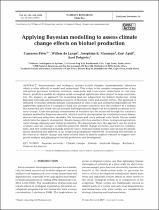 ResearchSpace
ResearchSpace
Applying Bayesian modelling to assess climate change effects on biofuel production
JavaScript is disabled for your browser. Some features of this site may not work without it.
- ResearchSpace
- →
- Research Publications/Outputs
- →
- Journal Articles
- →
- View Item
| dc.contributor.author |
Peter, C

|
|
| dc.contributor.author |
De Lange, Willem J

|
|
| dc.contributor.author |
Musango, JK

|
|
| dc.contributor.author |
April, K

|
|
| dc.contributor.author |
Potgieter, A

|
|
| dc.date.accessioned | 2010-07-23T14:31:25Z | |
| dc.date.available | 2010-07-23T14:31:25Z | |
| dc.date.issued | 2009-12 | |
| dc.identifier.citation | Peter, C,De Lange ,W,Musango, JK et al. 2009. Applying Bayesian modelling to assess climate change effects on biofuel production. Climate Research, Vol. 40, pp 249–260 | en |
| dc.identifier.uri | http://www.int-res.com/articles/cr_oa/c040p249.pdf | |
| dc.identifier.uri | http://hdl.handle.net/10204/4127 | |
| dc.description | Copyright: 2009 Inter-Research. This article is available on Open Access | en |
| dc.description.abstract | Socioeconomic and ecological systems exhibit complex, interdependent behaviour which is often difficult to model and understand. This is due to the complex reorganisation of key sub-system processes involving nonlinear, cross-scale and cross-sector interactions in real time. Hence, predictive models of complex social–ecological systems are often subject to large uncertainties. We propose an approach for evaluating land-use adaptations for biofuel production, using Bayesian networks and integrating research on the food, water and energy sectors. The approach is intended to facilitate interdisciplinary consideration of cross-scale and intersector dependencies. The authors applied this approach to 2 examples of land-use strategies and show how the resilience of a strategy that meets the new South African national biofuel production target can be assessed in relation to climate change. Cross-disciplinary consideration of variables may be enhanced through the sensitivity analysis enabled by Bayesian networks, which is used to conceptualise the conditional causal dependencies between subsystem variables. The authors formulate and run a national scale South African model which links the impacts of projected climate change effects in southern Africa to irrigated agriculture, water storage planning and biofuel production. The demonstrate how the approach can be used to evaluate land-use changes in different projected climate change scenarios and land-use combinations, and how conflicting demands between water, food and biofuel energy sources may be preliminarily identified and assessed in an integrated probabilistic framework. Evaluating this problem in the context of climate change and water-related limits to growth enables research to support integrated analysis and planning for biofuel production and development. | en |
| dc.language.iso | en | en |
| dc.publisher | Inter-Research | en |
| dc.subject | Biofuel production | en |
| dc.subject | Bayesian networks | en |
| dc.subject | Climate change | en |
| dc.subject | Resilience | en |
| dc.subject | Land-use change | en |
| dc.subject | Socioeconomic | en |
| dc.subject | Ecological systems | en |
| dc.title | Applying Bayesian modelling to assess climate change effects on biofuel production | en |
| dc.type | Article | en |
| dc.identifier.apacitation | Peter, C., De Lange, W. J., Musango, J., April, K., & Potgieter, A. (2009). Applying Bayesian modelling to assess climate change effects on biofuel production. http://hdl.handle.net/10204/4127 | en_ZA |
| dc.identifier.chicagocitation | Peter, C, Willem J De Lange, JK Musango, K April, and A Potgieter "Applying Bayesian modelling to assess climate change effects on biofuel production." (2009) http://hdl.handle.net/10204/4127 | en_ZA |
| dc.identifier.vancouvercitation | Peter C, De Lange WJ, Musango J, April K, Potgieter A. Applying Bayesian modelling to assess climate change effects on biofuel production. 2009; http://hdl.handle.net/10204/4127. | en_ZA |
| dc.identifier.ris | TY - Article AU - Peter, C AU - De Lange, Willem J AU - Musango, JK AU - April, K AU - Potgieter, A AB - Socioeconomic and ecological systems exhibit complex, interdependent behaviour which is often difficult to model and understand. This is due to the complex reorganisation of key sub-system processes involving nonlinear, cross-scale and cross-sector interactions in real time. Hence, predictive models of complex social–ecological systems are often subject to large uncertainties. We propose an approach for evaluating land-use adaptations for biofuel production, using Bayesian networks and integrating research on the food, water and energy sectors. The approach is intended to facilitate interdisciplinary consideration of cross-scale and intersector dependencies. The authors applied this approach to 2 examples of land-use strategies and show how the resilience of a strategy that meets the new South African national biofuel production target can be assessed in relation to climate change. Cross-disciplinary consideration of variables may be enhanced through the sensitivity analysis enabled by Bayesian networks, which is used to conceptualise the conditional causal dependencies between subsystem variables. The authors formulate and run a national scale South African model which links the impacts of projected climate change effects in southern Africa to irrigated agriculture, water storage planning and biofuel production. The demonstrate how the approach can be used to evaluate land-use changes in different projected climate change scenarios and land-use combinations, and how conflicting demands between water, food and biofuel energy sources may be preliminarily identified and assessed in an integrated probabilistic framework. Evaluating this problem in the context of climate change and water-related limits to growth enables research to support integrated analysis and planning for biofuel production and development. DA - 2009-12 DB - ResearchSpace DP - CSIR KW - Biofuel production KW - Bayesian networks KW - Climate change KW - Resilience KW - Land-use change KW - Socioeconomic KW - Ecological systems LK - https://researchspace.csir.co.za PY - 2009 T1 - Applying Bayesian modelling to assess climate change effects on biofuel production TI - Applying Bayesian modelling to assess climate change effects on biofuel production UR - http://hdl.handle.net/10204/4127 ER - | en_ZA |





